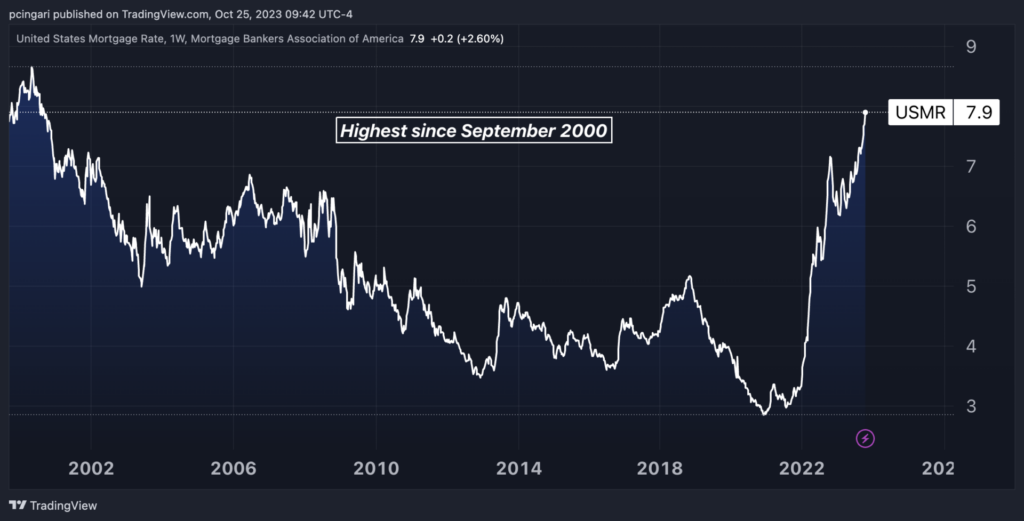Zinger Key Points
- Mortgage rates in the US surge to multi-decade highs, hitting 7.9%, driven by soaring long-term Treasury yields.
- San Francisco's housing market faces turmoil as property prices drop by 9.6% compared to 2022 levels.
- China’s new tariffs just reignited the same market patterns that led to triple- and quadruple-digit wins for Matt Maley. Get the next trade alert free.
Mortgage rates continue to climb in the U.S., reaching levels not seen in decades.
The latest weekly report from the Mortgage Bankers Association of America (MBA) sent fresh shockwaves through the housing industry, revealing that the average contract interest rate for 30-year fixed-rate mortgages has surged to 7.9%, marking its highest point since September 2000.
The MBA reported Wednesday that the average contract interest rate for 30-year fixed-rate mortgages rose to 7.9% at end of last week, hitting the highest level since September 2000.
30-Year Mortgage Rates Soar

The driving force behind this surge in mortgage rates is the relentless rise in long-term Treasury yields. Over the past week, the 30-year yield has breached the 5% threshold, causing ripples of concern among potential homebuyers.
Concurrently, the demand for new mortgages has been languishing as prospective property buyers are increasingly deterred by the prospect of shouldering such high-interest rates.
Read Also: Calculate Your Estimated Monthly Mortgage Payment
Data shared by the MBA continues to depict a concerning scenario as mortgage applications have registered a 1% drop in the last week, adding to the previous week’s decline of 6.9%. This downward trend has pushed the index that gauges mortgage demand volume to its weakest point since 1995.
Joel Kan, vice president and Deputy Chief Economist at MBA, commented on this alarming trend:
“Mortgage activity continued to stall, with applications dipping to the slowest weekly pace since 1995. These higher mortgage rates are keeping prospective homebuyers out of the market and continue to suppress refinance activity.”
San Francisco
San Francisco, long known for its booming real estate market, is now facing turbulent times as mortgage rates climb to multi-decade highs.
The Kobeissi Letter, a market analysis and commentary firm, recently observed that housing prices in San Francisco are now plummeting below mortgage values established just eight years ago.
For example, a property listed for sale reveals the magnitude of the issue: in 2015, the owner purchased the property for $1.4 million — 27% above the asking price at the time.
Now, in 2023, the same property is listed for a mere $1.1 million, representing a staggering 22% drop from what the owner originally paid. This unfortunate situation has left the homeowner with “negative equity,” a predicament that is becoming increasingly common across the nation, now hitting an estimated 1.2 million homeowners.
According to data from the Zillow Home Value Index (ZHVI), the average San Francisco home is down 9.6% over the past year, in stark contrast to the 1.1% increase in home prices observed nationwide.
Real estate stocks, as tracked by the Real Estate Select Sector SPDR Fund XLRE, fell 1.4% on Wednesday, retesting their 2023’s lows and currently trading at their lowest level since May 2020.
Now Read: Best Mortgage Refinance Rates
Edge Rankings
Price Trend
© 2025 Benzinga.com. Benzinga does not provide investment advice. All rights reserved.
Trade confidently with insights and alerts from analyst ratings, free reports and breaking news that affects the stocks you care about.